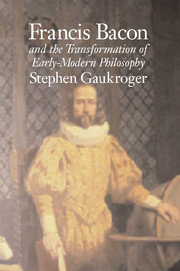Book contents
- Frontmatter
- Contents
- Acknowledgments
- References to Bacon's works
- Prologue
- 1 The nature of Bacon's project
- 2 Humanist models for scientia
- 3 The legitimation of natural philosophy
- 4 The shaping of the natural philosopher
- 5 Method as a way of pursuing natural philosophy
- 6 Dominion over nature
- Conclusion
- Bibliography
- Index
2 - Humanist models for scientia
Published online by Cambridge University Press: 12 January 2010
- Frontmatter
- Contents
- Acknowledgments
- References to Bacon's works
- Prologue
- 1 The nature of Bacon's project
- 2 Humanist models for scientia
- 3 The legitimation of natural philosophy
- 4 The shaping of the natural philosopher
- 5 Method as a way of pursuing natural philosophy
- 6 Dominion over nature
- Conclusion
- Bibliography
- Index
Summary
The idea of mathematics or mechanics as a model for natural philosophy was something that took shape gradually during the seventeenth century. By contrast, during the Renaissance the models were taken from a variety of areas in which argument, persuasion, discovery, and the many other things that one expected of natural philosophy were pursued. Law and textual criticism figured predominantly here, for these were areas in which major reforms were being introduced and which were continuing to yield benefits. For Renaissance thinkers – even those who, like Bacon, can take a significant share of the responsibility for the transition to modernity – it is above all the legal-rhetorical tradition that shapes their theoretical sensibilities. In the first instance, Bacon set out not to reform natural philosophy but to reform law and, through this, politics. His shift from the reform of law to the reform of natural philosophy is possible and, in a way that is initially very difficult for us to understand, natural, because what Bacon sees as the problems in law and natural philosophy have a number of shared – or at least analogous – sources. These sources are something embedded in English Renaissance culture, and Bacon very largely uses the resources of that culture to unearth and transform them. Consequently, our first priority must be that culture.
An education in rhetoric
Bacon was born into one of the most illustrious families in England. His father, Sir Nicholas Bacon, although from humble origins, was Lord-Keeper of the Great Seal of England, and was both eloquent and cultured.
- Type
- Chapter
- Information
- Publisher: Cambridge University PressPrint publication year: 2001



